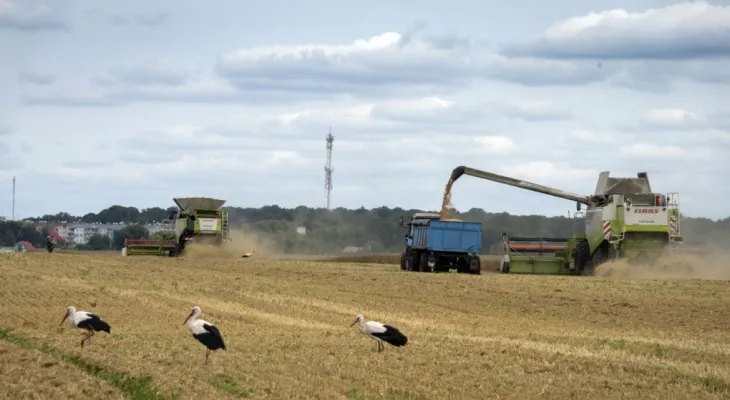Search here
Newspaper
Search here

Arab Canada News
News

Published: July 17, 2023
Russia suspended an unprecedented wartime agreement today, Monday, allowing the flow of grain from Ukraine to countries in Africa, the Middle East, and Asia where hunger poses an increasing threat and rising food prices have pushed more people into poverty.
Kremlin spokesman Dmitry Peskov announced that Russia will suspend the Black Sea grain initiative until its demands for its own agricultural shipments to the world are met, despite the country shipping record amounts of wheat and fertilizers that are also flowing."
Peskov said, "When the part of the Black Sea agreement concerning Russia is implemented, Russia will immediately return to implementing the agreement, Russia complained that restrictions on shipping and insurance have hindered its exports of food and fertilizers, which is also important for the global food chain."
The agreement was a breakthrough brokered by the United Nations and Turkey last summer to allow food to leave the Black Sea region after Russia invaded its neighbor nearly a year and a half ago. The deal provided guarantees that ships would not be attacked when entering and leaving Ukrainian ports, and a separate agreement facilitated the movement of Russian food and fertilizers amid Western sanctions.
The warring countries are the main global suppliers of wheat, barley, sunflower oil, and other affordable food products relied upon by developing countries, while analysts do not expect more than a temporary hiccup in food commodity prices because places like Russia and Brazil have increased wheat and corn exports, so food insecurity is increasing.
Ukrainian authorities did not immediately respond to requests for comment on Monday.
The war in Ukraine led to record high food commodity prices last year and contributed to a global food crisis also linked to other conflicts and the ongoing effects of the Coronavirus pandemic and drought and other climate factors.
The rise in the cost of grains needed for staple foods in places like Egypt, Lebanon, and Nigeria has worsened economic challenges and helped push millions more people into poverty or food insecurity.
People in developing countries are spending more of their money on meals, and poor countries that depend on imported foods priced in dollars spend more with weakening currencies and a need to import more due to climate issues; places like Somalia, Kenya, Morocco, and Tunisia are struggling with drought.
Global food commodity prices such as wheat and vegetable oils have dropped, but food was already expensive before the war in Ukraine and relief has not flowed to kitchen tables.
The Black Sea deal is extremely critical to the food security of a number of countries, and losing it will worsen problems for those facing high levels of debt and climate repercussions, said Simon Evenett, professor of international trade and economic development at the University of St. Gallen in Switzerland.
Evenett pointed out that rising interest rates aimed at targeting inflation as well as weak currencies make it difficult for many developing countries to finance dollar purchases on global markets."
The United Nations Food and Agriculture Organization said this month that 45 countries need external food aid and that rising local food prices are a driver of worrying levels of hunger in those places.
The Black Sea grain initiative allowed three Ukrainian ports to export 32.9 million metric tons of grain and other foodstuffs to the world, more than half of it to developing countries, according to the Joint Coordination Center in Istanbul.
But the agreement has faced setbacks since it was brokered by the UN and Turkey, with Russia briefly withdrawing in November before rejoining and extending the agreement.
In March and May, Russia extended the agreement for only 60 days instead of the usual 120 days, and the monthly volume of grain shipped fell from a peak of 4.2 million metric tons in October to 1.3 million metric tons in May, the lowest volume since the deal began.
Exports expanded in June to just over 2 million metric tons, thanks to larger ships able to carry more cargo.
Responding on Monday to a question about whether the attack on a bridge linking Crimea to Russia was a factor behind the decision on the grain deal, the Kremlin spokesman said it was not, these developments are not connected, Peskov added, "even before this terrorist attack, President (Vladimir) Putin announced our position on it."
Ukraine accused Russia of preventing new ships from joining the operation since the end of June, with 29 ships waiting in waters off Turkey to join the initiative, and joint inspections aimed at ensuring ships only carry grain and not weapons that could aid either side have largely slowed.
The average daily inspections steadily fell from a peak of 11 in October to about 2.3 in June, with Ukrainian and American officials blaming Russia for the slowdown.
Meanwhile, shipments of Russian wheat reached their highest levels ever after a large harvest, exporting 45.5 million metric tons in the 2022-2023 marketing year, with another record of 47.5 million metric tons expected in 2023-2024, according to USDA estimates.
Kaitlyn Welsh, director of the Global Food and Water Security program at the Center for Strategic and International Studies, said, "The previous number is more than any country exported in one year."
The agreement was renewed for 60 days in May amid Moscow's opposition, and in recent months, the amount of food shipped and the number of ships leaving Ukraine has declined, with Russia accused of blocking additional ships from participating.
Comments